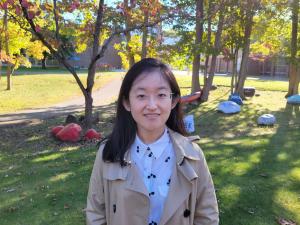As the U.S. strives for decarbonization and net-zero emissions, the electric power grid is rapidly transitioning toward a renewable-dominated system.
Event Actions
Abstract: The deep integration of renewables will fundamentally reshape power grid operations by introducing an unprecedented number of inverter-based resources (IBRs) across all levels of the grid. Specifically, three major challenges stand out: 1) the uncertainty from renewables creates unpredictable perturbations anytime and anywhere, rendering traditional scenario-based studies unverified; 2) the near-zero inertia of IBRs triggers fast and complex transients highly sensitive to disturbances; 3) the increasing complexity of inverter models further compounds these issues, creating curse of dimensionality concerns in grid operations. Under such circumstances, it becomes prohibitively challenging to guarantee the safety, stability, and resilience of power systems effectively and efficiently.
In this talk, I will present my research on enabling resilient, scalable, and verifiable smart grid operations through the synergy of AI, verification, and quantum computing (QC). First, I will introduce how to tractably and dependably verify uncertain renewable power systems to offer provable guarantees on their static, dynamic, stability, and safety behaviors. Second, I will discuss how to design physically-conformant AI methods to assist in the modeling, analysis, and operation of renewable power systems. Third, I will present my work on developing power grid-oriented QC technologies towards ultra-scalable grid operations, which also represents the world’s first quantum-power analytic that has been truly verified on real quantum hardware. During the talk, I will use diverse real-scale power systems and renewable integration scenarios (e.g., solar and offshore wind) to demonstrate our technologies. The talk will be concluded with future directions toward all-hazards-resilient power and energy systems through trustworthy grid operations.
Bio: Yifan Zhou is an Assistant Professor in the Department of Electrical and Computer Engineering at Stony Brook University since 2022. She received her Bachelor's degree with the highest distinction in 2014 and her Ph.D. degree in 2019, both from the Department of Electrical Engineering at Tsinghua University. Her research focuses on collaboratively integrating machine learning, quantum computing, and formal methods to enable intelligent, adaptive, and provably resilient power system operations and support extreme renewable energy integration. Her research is funded by DOE, ONR, New York State Energy Research and Development Authority (NYSERDA), and industry partners. She is an Associate Editor of IEEE Journal of Oceanic Engineering, Energy Reports, and IEEE Access (PES Section). For additional information, please visit https://yifanzhou.info/
